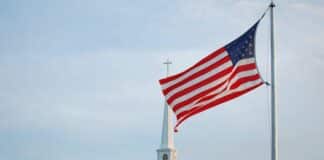Chief Justice John Roberts was the only dissenter in the U.S Supreme Court’s most recent ruling favoring a couple of Christian students who challenged their university for restricting when, where, and how they could speak about their faith and disseminate materials on campus.
Uzuegbunam et al. v. Preczewski et al. first materialized after Chike Uzuegbunam, a student at Georgia Gwinnett College, was stopped by campus police for handing out religious materials on campus, a reported violation of the school’s “Freedom of Expression Policy,” which limited distributions and other expressions to free speech zones only with permission from the administration. Even after Uzuegbunam moved to the designated areas with permission, however, campus police attempted to stop him from speaking and handing out religious literature, prompting him and another student, Joseph Bradford, to take legal action against the university for violating their First and 14th Amendment rights and seek nominal damages.
The students’ attempts to sue the school, however, were shot down by both a district court and the U.S. Court of Appeals for the 11th Circuit after Georgia Gwinnett College changed its “Freedom of Expression” policy to remove barriers on when and where students could speak on campus and filed a motion to dismiss the case as moot. The Supreme Court took up the case after Uzuegbunam and Bradford noted that their rights were still violated no matter what the university modified its policy to reflect and still required a ruling on nominal damages.
Justice Clarence Thomas authored the opinion of the court, agreeing with the students’ case.
“Applying this principle here is straightforward. For purposes of this appeal, it is undisputed that Uzuegbunam experienced a completed violation of his constitutional rights when respondents enforced their speech policies against him. Because ‘every violation [of a right] imports damage,’ Webb, 29 F. Cas., at 509, nominal damages can redress Uzuegbunam’s injury even if he cannot or chooses not to quantify that harm in economic terms,” Thomas concluded.
Roberts, however, in his first solo dissent, wrote that the court was acting as “a moot court” in deciding this case and their ruling.
“When plaintiffs like Uzuegbunam and Bradford allege neither actual damages nor the prospect of future injury, an award of nominal damages does not change their status or condition at all. Such an award instead represents a judicial determination that the plaintiffs’ interpretation of the law is correct — nothing more,” Roberts stated.






